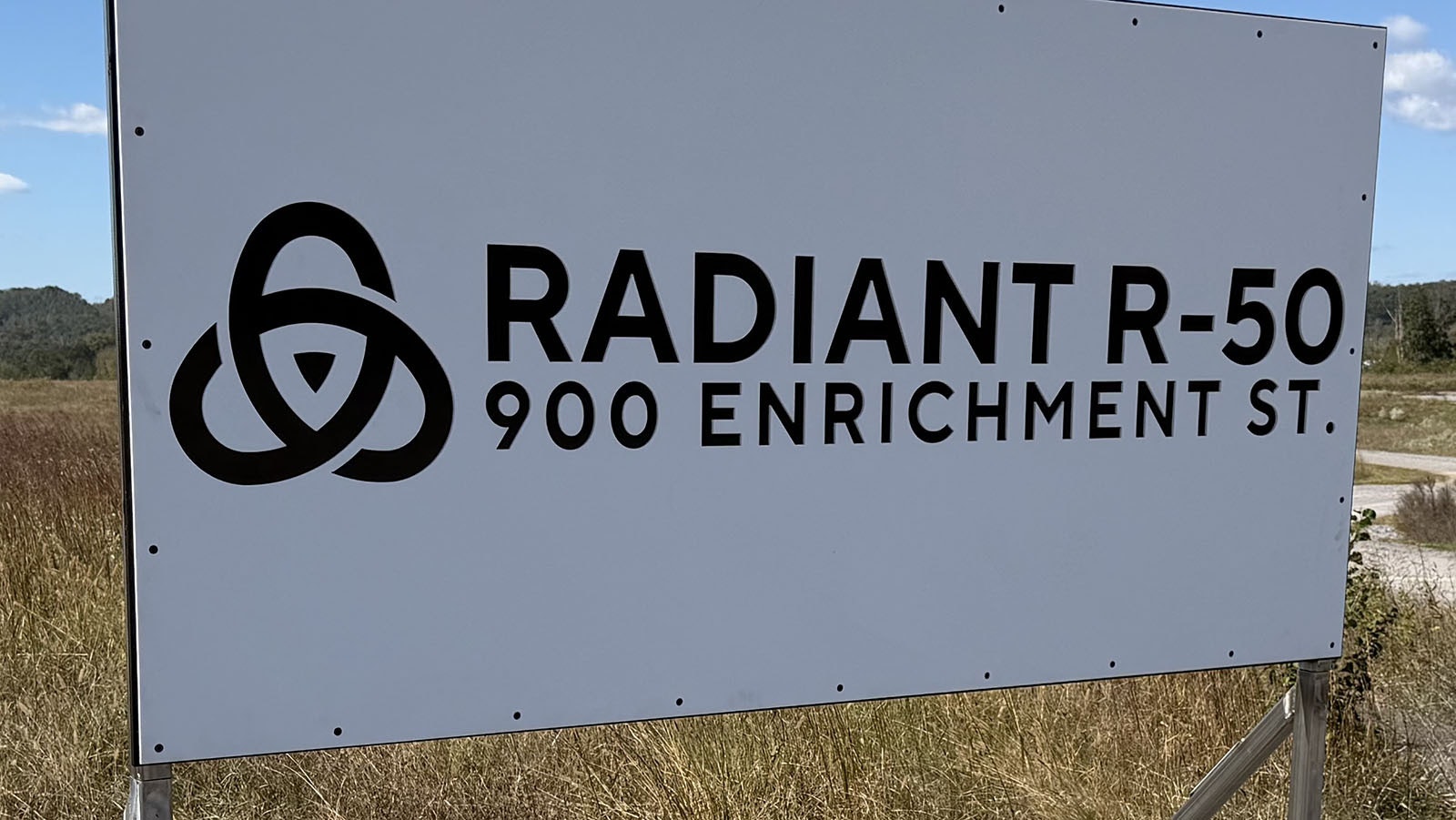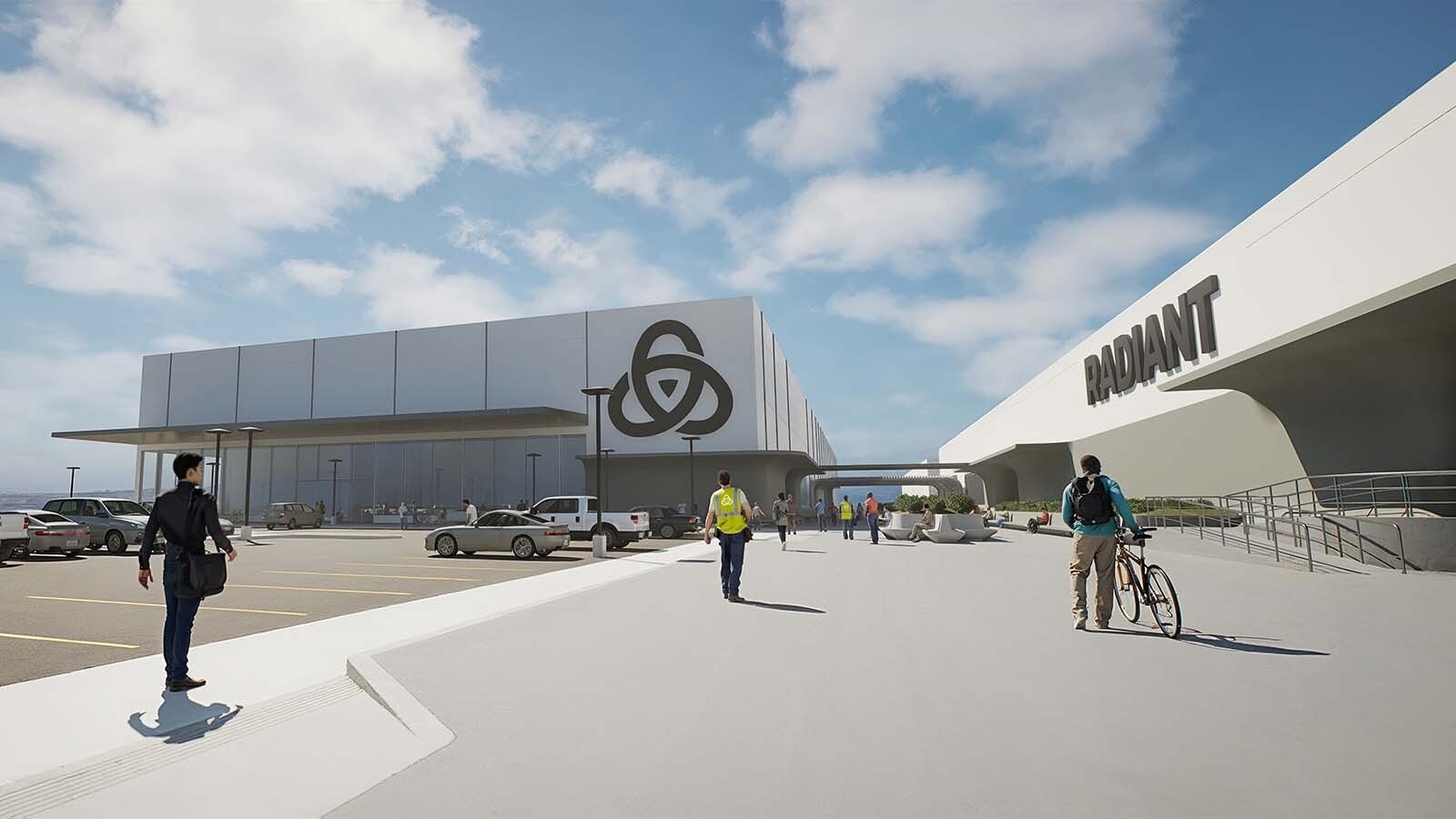Wyoming lawmakers and energy experts stand divided after Radiant Nuclear announced it will build its first microreactor manufacturing facility in Tennessee instead of Wyoming.
Some legislators say the state just made a catastrophic mistake comparable to rejecting the coal industry 50 years ago.
Others argue the loss of Radiant may not be a loss at all, with one university researcher suggesting most advanced nuclear reactor companies will likely fail before ever producing a single reactor.
At the center of the debate is a fundamental question about nuclear energy: Can Wyoming support nuclear power without accepting all parts of the fuel cycle?
Matt Wilson, Radiant's senior director of operations, says the answer is no.
"I've heard some folks say they're pro-nuclear, but not pro-spent fuel," Wilson said Tuesday on Cowboy State Daily's "Morning Show with Jake."
Wilson compared this position to someone who loves cattle and hamburgers but is opposed to the butchering process.
He added: "You can't be pro-nuclear if you aren't okay with the entire life cycle. And that includes some of the byproducts that every energy type has."

Deal Lost
Radiant announced Monday it will build its manufacturing facility in Oak Ridge, Tennessee, on property that once housed part of the Manhattan Project. The California-based company's decision to bypass Wyoming came down to regulatory certainty, Wilson said. The company had been planning for months to build a plant outside Bar Nunn in Natrona County.
"We had to take the certain path, which was Oak Ridge," Wilson explained. "After a lot of work to say, ‘Here's what we want to do in the community,’ when there was an unclear path after six months of participating in conversations, we're not willing to wait and see if February goes our way or not."
Wilson was referring to the next Wyoming legislative session scheduled for the first part of 2026. Looking back at Radiant’s work with legislators, Wilson pointed to the joint interim Minerals, Business and Economic Development Committee’s decision in July “to table this bill” as a key moment.
Radiant hoped the Wyoming Legislature would rewrite state law to allow the storage of spent nuclear fuel brought in from out of state.
In return for its planned investment in Tennessee, Radiant will receive a 50-percent, $22.7 million break on its taxes over a 15-year period, according to press reports.
The jobs Radiant will provide in Oak Ridge are expected to pay 150 percent of per capita income on average, according to a letter from the local city manager.
With construction beginning in early 2026, Radiant plans to deliver its first mass-produced Kaleidos nuclear generator by 2028 and scale up production to 50 reactors per year within a few years. The company has raised approximately $250 million to date.
Huge Mistake?
Tuesday morning, Gov. Mark Gordon blasted Radiant opponents in Wyoming, calling them “Club No.”
“‘Club No’ has ushered in a new culture of no matter who began or who commenced it, we’re against it,” said Gordon. “That is not the way Wyoming became the great state it is… Wyoming should not be held back by fear. We should be pioneers.”
Gordon added, “Let’s work together to ensure Wyoming remains open for business. We will not let the ‘Club No’ crowd define our future.”
The governor’s sentiment was echoed by Sen. Ed Cooper, R-Ten Sleep, who said polls show a wide majority of Natrona County residents favored the Radiant project.
"This is a small, very vocal minority, and unfortunately, that's what got the voice," Cooper told Cowboy State Daily.
Cooper emphasized the national defense applications of Radiant's technology, noting that an estimated 60 percent of U.S. military casualties in the Middle East were related to fuel convoys to power diesel generators — which might be replaced by deploying microreactors.
"It's a national defense question, not just a Wyoming question," he said.
Cooper also described interest from Alaska, where remote villages currently rely on fuel shipped in during ice-free months.
"What they're running these generators on — these type applications to bring this, just like a reactor and shut it down and plug it in and not have to worry about your fuel supply for the next five years — it's phenomenal," Cooper said.
Rep. Steve Harshman, R-Casper, said he was "incredibly disappointed" by the decision and compared it to rejecting the coal strip mining industry 50 years ago.
"Wyoming would be a different place if we didn't have the coal industry and what it's provided our state and our people," Harshman said.
Harshman said Wyoming needs to change "about two words in the statute" to allow for on-site waste storage, adding that nuclear energy is "by far the safest, cleanest, greenest, cheapest there is."
"Wyoming had a chance to take our uranium and turn it into fuel and keep it here to generate electricity instead of shipping all of our products out of state," he said.

Pro-FOMO vs. No-FOMO?
Members of the Wyoming Freedom Caucus, including Rep. Bill Allemand, R-Midwest, continue to argue that it is possible to be both pro-nuclear and anti-nuclear waste.
Rachel Rodriguez-Williams, chairman of the Freedom Caucus, told Cowboy State Daily it "draws the line at out-of-state waste storage."
She said the group is standing up to California billionaires who "insist on saddling our landscapes with their windmills, their solar panels and now their radioactive waste."
At several public meetings, members of the Freedom Caucus made it clear they do not have “Fear Of Missing Out (FOMO)” when it comes to companies like Radiant.
Neither does Alan Kuperman, a professor of public affairs at the University of Texas-Austin, who offered a contrarian view of Radiant and the microreactor industry.
“I’m not sure Wyoming should have FOMO,” Kuperman told Cowboy State Daily, citing his research into the microreactor industry. "The vast majority of companies like Radiant that are proposing to build advanced nuclear reactors are going to go out of business before building a single reactor.”
Kuperman noted that Radiant's proposed reactor is particularly small — one megawatt electric output — which he says creates severe economic challenges.
"What Radiant is proposing to do is to produce the most expensive electricity," Kuperman said. "That's what they're proposing to do — to produce the world's most expensive electricity."
He questioned whether there would be a viable market for such expensive power, noting that while the Department of Defense, remote mining operations, or Arctic villages might be potential customers, the economics don't favor widespread adoption.
Regarding the company's ambitious production goals, Kuperman was blunt: "This idea that Radiant has of producing thousands of these — no, no one is going to be buying those. Not going to happen.”
Secret City
The facility Radiant plans to build will be named R-50. It will rise on portions of the historic K-27 and K-29 Manhattan Project sites in Oak Ridge.
Oak Ridge's role in America's nuclear history dates to World War II, when it was established as part of the top-secret Manhattan Project. The site enriched uranium for the atomic weapons program, earning Oak Ridge the nickname "The Secret City."
According to the Department of Energy, the K-27 and K-29 facilities were built as expansions following the original K-25 gaseous diffusion plant — the world's largest building at the time in 1945. The facilities separated uranium-235 from uranium-238 using gaseous diffusion, first for wartime atomic bomb production and later for Cold War weapons programs.
Of the 125,000 workers at three Manhattan Project sites, only 1,000 knew the exact purpose of their work, according to the DOE.
"What was formerly the first Manhattan Project site will now be the site of the first portable nuclear generator production," said Doug Bernauer, Radiant's CEO and co-founder, in a statement.
Door Still Open?
Wilson said Tuesday that Radiant will continue to cheer on supporters of Wyoming’s nuclear industry.
"I do hope that there is a nuclear ecosystem that continues to grow" in Wyoming, he said.
For now, though, Tennessee has what Radiant said it needed most: regulatory certainty.
"Oak Ridge has a very stable government," Wilson said. "They're like, ‘Come here. Look at our track record. We care about nuclear. We understand that 20 percent of the United States’ energy comes from nuclear. You are going to be successful here. And we are going to do whatever you need to be successful here.’"
David Madison can be reached at david@cowboystatedaily.com.






